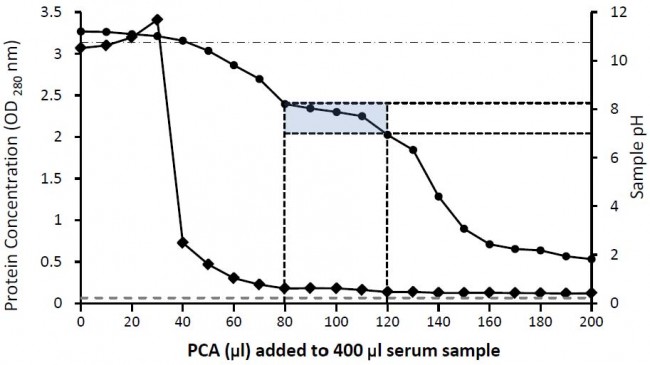Deproteinizing Sample Preparation Kit
Datasheet (PDF) | Safety Data Sheets (MSDS)(PDF)
View All Related Products
Description
The presence of protein and various enzyme activities frequently interferes with the analysis of small molecules in biological samples. Many bioassays require removal of proteins from samples prior to analysis. Among the deproteinization protocols developed over the last half century, perchloric acid (PCA) precipitation has been extensively used in many different sample preparation procedures, since not only does it remove most of the protein present but it also functions to stabilize many of the small molecule analytes. PCA deproteinization methods have been successfully used in the preparation samples prior to quantitation of an array of small molecules, including glycogen, ATP, cAMP, glutathione, antioxidants, etc.The newly designed Deproteinizing Sample Preparation Kit utilizes a PCA precipitation method, providing a unique tool to prepare samples for the analysis of a variety of small molecules. Using the kit, proteins are precipitated, excess PCA is removed, samples are neutralized. Samples prepared using this kit can be directly used in a wide variety of bioassays. The method is easy, convenient, and can be used for the preparation of a large number of samples.
Datasheet
| Cat # +Size | K808-200 |
|---|---|
| Size | 200 assays |
| Species Reactivity | Mammalian |
| Applications | Unique tool to prepare samples for the analysis of a variety of small molecules, proteins are precipitated, excess PCA is removed, samples are neutralized. |
| Features & Benefits | • Samples prepared using this kit can be directly used in a wide variety of small molecule bioassays. |
| Kit Components | • PCA • Neutralization Solution |
| Storage Conditions | RT |
| Shipping Conditions | RT |
| USAGE | For Research Use Only! Not For Use in Humans. |
FAQ
What is the difference between K808 and K823?
They are both acid based protein precipitation method. K808 is PCA based and K823 is TCA based.
CITATIONS
1.Mitrea DM, et al., (2018) Self-interaction of NPM1 modulates multiple mechanisms of liquid–liquid phase separation, Nature Communicationsvolume, Feb. 2018, 29483575
2. Schneider, Gabriela et al. (2016) Induction of a Tumor-Metastasis-Receptive Microenvironment as an Unwanted Side Effect After Radio/Chemotherapy and In Vitro and In Vivo Assays to Study this Phenomenon, Methods Mol Biol. 2016;1516:347-60.
3. Koczor et al., AZT-induced mitochondrial toxicity: an epigenetic paradigm for dysregulation of gene expression through mitochondrial oxidative stress. Physiol Genomics, Oct 2015; 47: 447 - 454.
4. Kim et al., Mice expressing reduced levels of hepatic glucose-6-phosphatase-α activity do not develop age-related insulin resistance or obesity. Hum. Mol. Genet., Sep 2015; 24: 5115 - 5125.
5. Entomol et al., Effects of Oral Exposure to Fungicides on Honey Bee Nutrition and Virus Levels. J Econ Entomol, Aug 2015; 10.1093/jee/tov251.
 We're here to help
We're here to help
Get expert recommendations for common problems or connect directly with an on staff expert for technical assistance related to applications, equipment and general product use.
Contact Tech Support
 High Quality Guaranteed Product
High Quality Guaranteed Product
Our products such as Elisa, Antibodies, Proteins, Peptides and sequencing kits are covered by Biolinkk quality warranty and will work as described in datasheet, a free replacement or money back is guaranteed if does not perform according to datasheet.
Learn More



